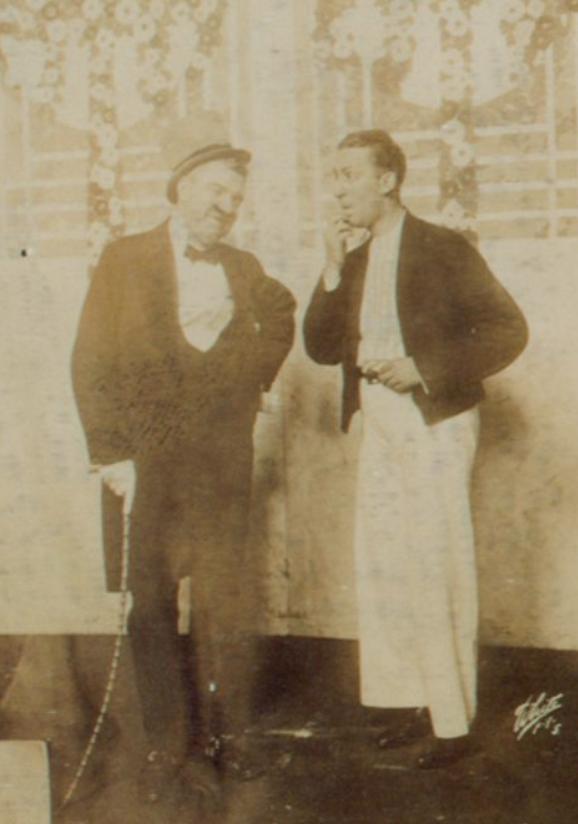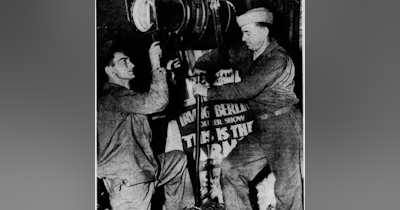Above, an advertising card for W.C. Fields, early in his career.
You might note that this entry has rather less text than we usually share in our blog - but after all, we put so much into the episode itself! (It's the longest one we've ever released, in fact.) Plus, there is a VERY extensive list of sources at the bottom of the post, with many links that will lead you to some wonderful articles and resources. We especially recommend Trav S.D.'s "Travalanche" website, as well as his book No Applause, Please Throw Money, the Book That Made Vaudeville Famous.
Here are some additional photos of our subjects from this episode . . .
Larry Fine, as a young man, with his violin . . . and his portrait at 300 S. Street. (Unfortunately the restaurant beneath his mural was empty and shuttered, back in March of 2023 when this photo was taken. I'm not sure if it has a current tenant, as of this writing.):
By the way, I just came across a newspaper article from December of 1934, in which W.C. Fields objected to calling his sidekick Tammany Young, in the movie It's A Gift, a "stooge." Fields much preferred the term "associate."
"A stooge," explained Fields, "is a person who permits himself to be kicked, hit, slammed, knocked down or otherwise abused by a so-called comedian who gets his laughs by mistreating stooges. I don't work that way. I don't need stooges to get laughs. If I can't be funny without hitting somebody, I don't want to be funny. . . Tammany is in no sense a stooge. He's a foil, and there is plenty of difference."
Below, Walter C. Kelly, in a photo of him walking along the boardwalk in Atlantic City, New Jersey, circa 1907. The image was printed in a 1953 edition of his autobiography Of Me I Sing, which was published after his death. (It's an entertaining and informative book, and he's not a bad writer at all. But it did nothing to change my bad opinion of him.)
When he was appearing in the 1910 Broadway show, The Deacon and the Lady, Ed Wynn was profiled in an article in the Philadelphia Inquirer. It tells the story of his father's disapproval, and of why he changed his name. In the many extant recordings and movies and TV shows he subsequently appeared in, you can hear that Wynn - like Larry Fine - also changed his accent! Its certainly not Philadelphian, but sounds very Brooklyn, to my ear. My theory is that there were so many Brooklyn comics in show biz back then, that others like Wynn changed their intonations to a sort of general Brooklynese, too.
Here's a photo from 1911, from the collection of the Victoria & Albert Museum in London. It shows unidentified actors in an early production of J.M. Barrie's play The Twelve Pound Look. Here the typist arrives at the home of her former husband, only to see that his new wife, in her estimation, is secretly just as discontented with married life as she herself once was:
Above, Ethel Barrymore, in a 1902 production of the play Carrots (left), and in a 1919 production of Declasse (right).
Below, W.C. Fields and Ed Wynn (without a hat, for a change) in the Ziegfeld Follies of 1915:
Finally, a portrait of Ethel Waters, taken when she was a young woman:
But what about "Sober Sue"? You ask . . Well, I DID manage to find an extremely rare and previously unknown image of her! Don't Google it, though - you won't find it! It's exclusively on our Patreon page - if you'd like to see it, sign up to be a Patron of Theater History! You won't regret it!
https://www.patreon.com/posts/sober-sue-sneak-93947660
Selected Bibliography:
Books -
Barrymore, Ethel, Memories, An Autobiography. Harper & Brothers (Reprinted by Kraus Reprint Co.), 1968.
Bourne, Stephen, Ethel Waters: Stormy Weather. The Scarecrow Press Inc., 2007.
Cullen, Frank; Hackman, Florence; McNeilly, Donald, “Walter C. Kelly,” pp. 627–629 in Vaudeville, Old and New: An Encyclopedia of Variety Performers in America. Psychology Press, 2006. (Accessed via Google Books.)
Curtis, James, W.C. Fields: A Biography. Alfred A. Knopf, 2003.
DiMeglio, John E., Vaudeville USA. Bowling Green University Popular Press, 1973.
Kelly, Walter C., Of Me I Sing: An Informal Autobiography. The Dial Press, 1953.
Toll, Robert, On With the Show: The First Century of Show Business in America, Chapter Ten, “The Vaudeville Show - Something For Everyone,” pp. 266-293. Oxford University Press, 1966.
Trav S.D. (Donald Travis Stewart), No Applause - Just Throw Money: The Book That Made Vaudeville Famous. Faber and Faber, 2005.
Articles -
Johnson, Alva, “Profiles: W.C. Fields - Legitimate Nonchalance,” The New Yorker, Issues of February 2, 9, and 16, 1935.
McCorkle, Susannah, “The Mother of Us All,” American Heritage, February/March 1994, Vol. 45, Issue 1.
“Sober Sue,” Variety, Vol. VIII, no. 3, June 29, 1907.
“The Great Composer S. Coleridge Taylor Simply Skins A Prejudiced Virginian In An English Magazine,” Cleveland Gazette, September 26, 1908.
Trav S.D. (Donald Travis Stewart) on Travalanche (website):
- “Ethel Waters: Baltimore, Broadway, and Billy Graham”
https://travsd.wordpress.com/2009/10/31/stars-of-vaudeville-72-ethel-waters/ - "Larry Fine: Profile of a Middle Stooge"
https://travsd.wordpress.com/2023/10/05/larry-fine-profile-of-a-middle-stooge/ - “The Barrymores in Vaudeville (Especially Ethel!)”
https://travsd.wordpress.com/2009/08/15/stars-of-vaudeville-48-and-49-the-barrymores-and-baby-rose-marie/ - “The Truth About W.C. Fields and Philadelphia” https://travsd.wordpress.com/2016/12/12/the-truth-about-w-c-fields-and-philadelphia
- “Walter C. Kelly: The Virginia Judge”
https://travsd.wordpress.com/2009/10/29/stars-of-vaudeville-69-and-70-jack-pearl-and-walter-c-kelly/ - “What Was Black Vaudeville?”
https://www.youtube.com/watch?v=MX_5bfUX1rQ
Tyson, Howard, “The Legend of Whitey: W. C. Fields’ Philadelphia Roots” on DarbyHistory.com:
https://www.darbyhistory.com/WCFields.htm
Videos -
Ethel Barrymore
"Stage Loses Leading Light in Retirement of Ethel Barrymore" - YouTube:
https://www.youtube.com/watch?v=9Lu2uBhRi2M
“The Twelve Pound Look: Adapted From The James M. Barrie Play. Omnibus With Alistair Cooke” - YouTube:
Part One: https://www.youtube.com/watch?v=_VmWGjjRVRI
Part Two: https://www.youtube.com/watch?v=RlS4-u6xLYE
W.C. Fields
“The Old Fashioned Way 7” - YouTube: https://www.youtube.com/watch?v=ytgPGr6JhLo
Larry Fine
“Three Stooges: “Slowly I Turned” - YouTube https://www.youtube.com/watch?v=MYP1OBZfFK0
Walter C. Kelly
“Virginian Judge (Vaudeville skit) by Walter C Kelly 1926” - YouTube
https://www.youtube.com/watch?v=MX_5bfUX1rQ
















